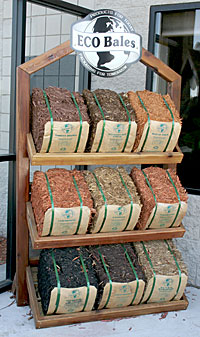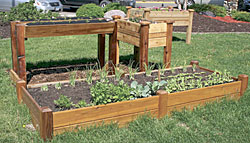BioCycle August 2009, Vol. 50, No. 8, p. 17
Working harder on improving systems, packaging efficiencies and product diversification, company carves out a path to broaden operations.
Larry Trojak
AMID the economic slowdown, Rivard Companies in East Bethel, Minnesota has chosen to view these times not so much as problematic but rather as a time to rethink strategies. This has meant broadening the scope of their operation through new products and new markets. As a result, in what can best be described as a “challenging” business environment, Rivard is at its highest level of employment ever. One existing line of products has begun to flourish and another new line is taking off, and Rivard is genuinely excited for what lies ahead.
“Our approach to the whole downturn was this: we have a lot of great people here, we’ve built our business up to a nice level,” says Mike Rivard. “To us laying people off, cutting costs and waiting to see what the next day might bring, just causes a domino effect and worsens things. People start thinking doom and gloom and bring it about. We prefer to think that, when you know things are going to get slow, you should work harder, come up with new products, establish new markets and go after new things.”
The genesis of Rivard Companies is probably similar to that of many other mulch businesses. Started in 1989 by Lisa and Mike Rivard as a tree removal and trimming service, the company established a clientele, grew the business and was soon handling large-scale land clearing jobs in the Twin Cities of Minneapolis and St. Paul. As the land clearing business grew, so did the amount of wood chips left over at job sites – chips that, according to Mike Rivard, were sold to local companies to turn into mulch.
“We realized that we were missing an opportunity, so we purchased a colorizer to create colored mulch ourselves,” he recalls. “Doing so allowed us to eliminate ‘the middle man’ and, in 2003, we established Central Wood Products. From the outset, we knew that we wanted to provide customers with a higher quality mulch than anything offered by the competition. So we doubled the amount of color additive and began running wood chips through the grinding process twice. This gave us a longer lasting, richer colored mulch and helped us gain a foothold in that market. Today more than half of all the mulch sold in the region comes from our yard.”
EXPLORING NEW HORIZONS
Not content with just the two facets of the business – land clearing and mulch sales – the Rivards established a working relationship in 2007 with Filtrexx Land Improvement Systems to begin manufacturing and supplying their FilterSoxx products. Based on Rivard’s existing relationships with area construction firms and contractors from the land clearing side of the business, entering into such an arrangement made perfect sense. While the Filtrexx products were a nice alternative to silt fence in erosion control applications, it was not so easy to get that message out to customers.

“When we first started offering erosion socks a few years ago, not that many people were familiar with the concept,” explains Rivard. “In the construction world, contractors are sometimes resistant to change, and silt fence was ‘the way it’s always been done.’ But we’ve worked hard to educate people through direct mailings, passing out literature at shows, and through the seminars we conduct. Those efforts seem to be paying off. We are seeing more and more instances where alternative erosion control products are being considered.”
The seminars are annual events that Rivard Companies calls Erosion Control Expos. They are offered free of charge to anyone in the area interested in what new technologies and alternatives are available. Guest speakers always include experts in a range of fields, offering insight from the point of view of manufacturers, installers and government agencies. “Ultimately, our goal is to help our customers learn to use the right products for the right application,” notes Rivard. “So when we have, for example, Dwayne Stenlund from the Minnesota Department of Transportation discussing ‘Filter Fence Technology’ or ‘The Art of Rapid Response,’ professionals engaged in this type of work can’t get any better advice or information. And for us, a better informed customer is a more satisfied one.”
IMPROVING SYSTEMS
The success of the erosion control line has prompted Rivard to offer a broader range of products for that market. It has also led to the development of, among other items, a metal staking system and tool that make installation less labor intensive and more efficient. “We are all about improving on things to make the job easier, more efficient or more cost-effective,” he says. “For example, we fill our erosion socks using a machine built by Progressive Innovations, a Cambridge, Minnesota company that also builds them for Filtrexx – but we’ve made some significant changes to it. Essentially it is a bucket with an auger in it. The unit was designed to run off the hydraulics of a skid-steer loader. We mounted it onto a permanent stand in the yard, made it longer and wider, added more augers and converted it into a stationary unit. More importantly, however, is the manner in which we power it.”
In most cases, says Rivard, the socks are filled by a blower truck powered by a 300 HP diesel engine. As a result, operating costs are much higher and the cost for the Soxx reflects it. “We power our stationary sock-filling unit with one of our 50 HP electric-over-hydraulic motor designs that we built for our balers. They operate for about $2 an hour versus the roughly $85 an hour the operator of a blower truck has to charge to cover costs. We feel it’s a much better way to do it in terms of cost, efficiency and environmental impact.”
With growth has come the need for additional equipment to meet everyday needs. Rivard operates a trio of 1,000 HP horizontal grinders (a pair of Model 5680 Bandits and a Peterson Model 6700B); three John Deere loaders; five skid-steer loaders; and a 40-foot Swift conveyor used to feed any of three self-built balers used for the ECO-bale process. The land clearing operation has a Morbark 30/36 Whole Tree Chipper, two Rayco 275 stump grinders and two slashers made by Hood and a Prentice. The loaders are shared with the yard operation. “It seems we are constantly adding equipment or, in a lot of cases, building it ourselves,” says Rivard.
PACKAGING EFFICIENCIES
The company’s push for efficiency extends to all facets of the business. Faced with last year’s rising transportation costs, Rivard and his crew devised a way to keep costs associated with shipping their filter sock products in check. “It’s very simple – but very effective,” he says. “We built a box that wraps around the pallet to contain it, and then wind the sock back and forth within the box into a nice tight coil, which is loaded onto to a slightly larger pallet and wrapped. Before we did this, we were told we could only get 50 to 75 feet of product on a pallet – we can now get 150 feet. That saves on transportation, packaging costs and labor.”

To reduce waste and improve efficiencies in their mulch delivery operation, Rivard introduced ECO-Bales, one of the most innovative products to hit the mulch industry in a long time (patents are pending on the ECO-Bale concept as well as several components of the product and process itself). The highly-compressed ECO-Bales were designed to improve the way large volumes of mulch are packaged, handled, transported and sold. “We feel very good about the packaging issue,” says Lisa Rivard. “When compared to the traditional bag mulch, each ECO-Bale reduces the amount of plastic packaging by approximately 75 percent. Even the plastic bale bands are made from partially recycled plastic and are 100 percent recyclable.”
Because the bales are so compact and stable in transit, greater volumes can be delivered at a time, saving on both fuel and driver costs. In addition, ECO-Bales can be shipped as a mixed load allowing customers to have up to nine different products on a single flatbed. “And, because the bales are so stackable, there is no need for costly storage bins to segregate the material upon delivery,” she adds. “We only started offering ECO-Bales last year and sold about 75,000 units; this year, 200,000 units is a real possibility. They offer a wide range of benefits and, as a result, have really taken off.”
GROWING INTO GARDENING
When the Rivards started getting a hint of an economic change in the wind, they began an intensive period of self-taught market research in pursuit of what Mike calls “the next big thing.” It resulted in some interesting discoveries, which, in turn, led to some even more interesting product introductions. “We started out looking for things that do well in a bad economy and came upon gardening,” he explains. “In hard times, it generally always does well – as a country, we saw that in World War II with the Victory Gardens. Even in tough times like these, most people still have some disposable income and after they’ve saved what they have to, they want to spend it on something small but tangible, and gardens give them that. Plus, people are seeing more and more that growing your own vegetables is a good thing from the standpoint of both cost-savings and health. It seems like we were onto something.”
In their quest for the right answer, the Rivards also stumbled upon an interesting health-related tidbit: 80 percent of people in the U.S. suffer from back pain at some point in their lives, and 65 million Americans suffer from back problems every year. Coupling that with the notion of an ever-increasing senior population, the ever proverbial light bulb went off for them. “We knew we wanted to make a line of unique gardening products designed around simplicity, ease of use, a compact footprint (to address issues of lack of space), ease of assembly and most of all, accessibility,” says Lisa Rivard. “We think we’ve done that in our line of Gronomics products which we debuted earlier this year.”

That full product line is available at the retail level from the company’s website (www.cwpmulch.com) and, on a more limited scale, though national garden centers. The line includes Elevated Garden Beds, which are 32-inches high for ease of planting without bending; Raised Garden Beds, which are a more traditional form of garden box but can also be fitted with a trellis for climbing plants or vegetables; Grosocks, a self-contained, ready-for-watering growing medium (using the Filtrexx Gardensoxx); Gronomics Mix, a specially-blended, professionally- tested growing mix; Trays, which can be used as window boxes, with exterior hangers, on fences, deck railings, etc.; and Stands, triangular units with either three or five planting sections. The Gronomics line has taken off at a pace that surprised even the Rivards, but they have met all supply issues head on and currently have a crew of nine dedicated solely to creating the all-cedar Gronomics products.
“There have been others who have tried to address this market, but we feel we’ve struck the right chord with what we offer,” says Mike Rivard. “For one, these are all cedar, hand-made, finish-sanded and very attractive to look at. More importantly, however, they can be assembled in about five minutes – without any tools. We understood going in that a good portion of our population is intimidated by tools and complicated assembly routine so we made it a ‘tool free’ assembly process.”
Larry Trojak is with Trojak Communications in Ham Lake, Minnesota.










